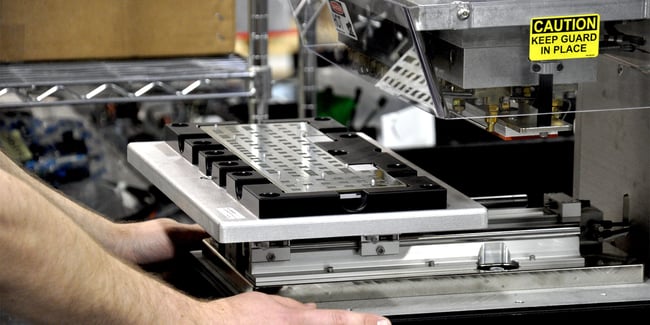Case Study: Data Input Keyboard for Critical-Application Medical Device

Written by Ross Schloegel
Relationship building is a priority at GMI, and the effort rarely fails to prove beneficial. Such was the case with a project recently transferred to us. An individual who was familiar with GMI who had accepted a position at a new company reached out to GMI for help with a keyboard used for data input as part of a critical-application medical device. While the customer acknowledged that the project was somewhat atypical for GMI, she returned because of her positive experience with us and the level of trust she had in our expertise, quality, and service.
Challenges
The keyboard presented ongoing issues for the customer’s former contract manufacturer. GMI was tasked with addressing:
- In-process scrap rates
- Quality issues
- Field failures
- Delivery delays
- Inventory challenges
A Multi-Pronged Solution
In examining samples from the previous contract manufacturer and related design and requirements documentation, several opportunities for improvement immediately stood out — specifically, assembly process automation and repeatability refinements, and testing simplification. If implemented, these corrections would greatly improve processes, productivity, and product quality.
GMI dedicated team members and an assembly cell on the manufacturing floor solely to the keyboard project in order to fully optimize a solution that was time-, cost-, and labor-efficient.
Process Improvements
- Revised assembly process plan and created a dedicated assembly cell to monitor, manage, and improve assembly flow.
- Implemented new equipment to automate the gluing process to increase control over glue placement, improve product quality/consistency, and significantly reduce scrap components caused by errant gluing.
- Replaced handheld ultrasonic welding process with single-operation heat staking to improve part joining consistency and better manage time and process flow.
- Re-worked inventory process to ensure what’s needed is on the GMI shop floor.
Productivity Improvements
- Designed and created fixtures and jigs to aid in assembly, including a device to secure and place nuts during keyboard assembly, and a roller tool to simplify elastomer handling.
- Purchased dedicated heat staking systems, automated gluing equipment, and several additional handheld tools to make certain assembly steps more efficient, thereby cutting time and labor investment.
- Introduced innovative clamp/curing solution that doubles as packaging, thereby significantly reducing excessive use of plastic bags and filler material, and excessive use of manufacturing floor space to store keyboards during prolonged glue curing times.
Results
By identifying and implementing these process and productivity improvements, GMI Solutions helped the customer reach her main goal of defect-free, on-time keyboards, and realized impressive efficiencies and results: Takt times for some operations dropped by as much 75% with increased consistency via automation. Scrap was also significantly reduced, with waste nearly eliminated for some components. In addition to time savings, the process and tooling improvements resulted in measurably higher field reliability.
Our returning customer is now a customer for life, and we appreciate her continued confidence in GMI Solutions. We firmly believe that the alignment of skills, culture, and capabilities makes for a successful partnership and successful outcomes. Want to learn more? Contact GMI Solutions to see how we can work together to help you reach — and exceed — your goals.





